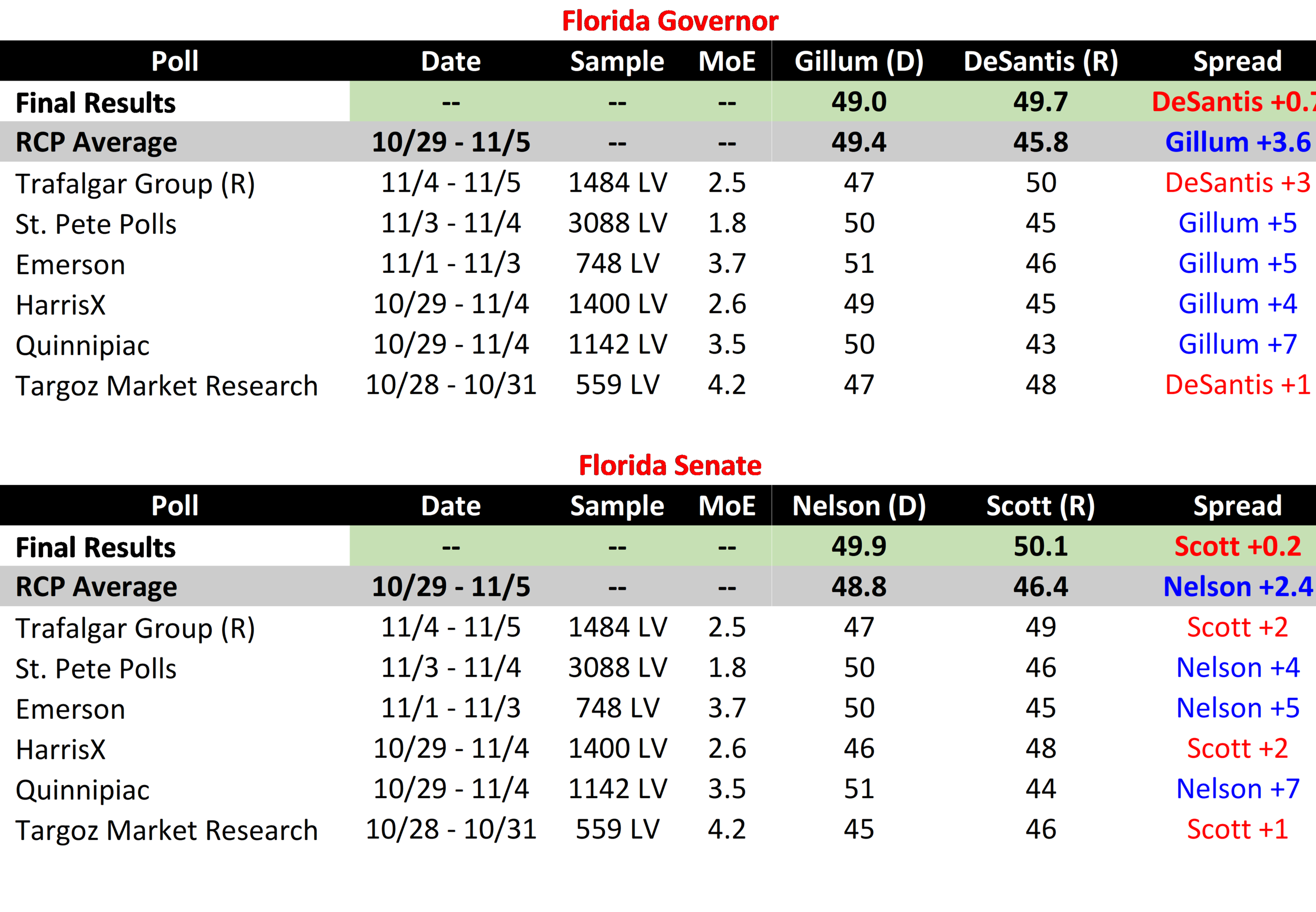2018 Midterms: Reviewing How We Did And One Big Headscratcher…
Before last week’s midterms, we released four public polls covering key races in Tennessee and Florida.
Overall, the accuracy of our polls was quite good.
In Florida, we were one of the few polling organizations to accurately predict narrow one-point wins by former Governor Rick Scott over incumbent Bill Nelson in the senate race and Congressman Ron DeSantis over former Tallahassee Mayor Andrew Gillum in the race for governor.
Since it’s Florida, we will not know the final vote tally for at least another week while recounts, competing lawsuits, and numerous court decisions decide the final outcome. Regardless, we nailed the election night totals.
In Tennessee, we correctly forecasted an easy win for Republican Businessman Bill Lee over former Nashville Mayor Karl Dean in the governor’s race. Lee won by a surprising 21 points. The RealClear Politics average predicted a 14-point win and our polling showed a nine-point win.
In looking at the polling of the race, it appears most of the undecided voters ended up voting for the Republican candidate, Bill Lee.
The real headscratcher for us was the Tennessee Senate race. Our polling, along with a nearly concurrent poll conducted by East Tennessee State University, indicated a very close race.
Our polling showed former Democratic Governor and Mayor of Nashville, Phil Bredesen tied with Republican Congresswoman Marsha Blackburn at 47% of the vote with 6% of likely voters undecided.
Election night, Blackburn won the race easily by 11 points. (55% to 44%)
So what happened? It appears undecided voters broke en masse to the Republican candidate (Blackburn) just as they did in the Tennessee Governor’s race.
We compared our polling by region versus the preliminary vote totals by region. As you can see below, our margins are close to the actual vote in East and West Tennessee.
So what happened in Middle Tennessee? We had Bredesen up 8 points in Middle Tennessee, but Blackburn won her home region by 6 points. Before serving as governor, Bredesen served two terms as Mayor of Nashville so it was expected that he would do quite well in the region, which also trends Democrat. Blackburn has lived and represented Williamson County (which is just south of Nashville) for many years. However, these results were still a surprise.
We took at a look at the turnout for the state and Metro Nashville Davidson County and Shelby County (Memphis). Statewide, it appears turnout was up 55% over the 2014 midterm elections. In Shelby County, turnout was only up 47% from 2014 and in Metro Nashville Davidson County just 50%.
At first glance, it appears turnout in Davidson and Shelby, both Democrat strongholds, was a bit lower than expected and lagged the increases we saw across the rest of the state. It will be a few more days until we get precinct level data, but it looks like turnout in Shelby and Davidson should have been higher which would have it made it a closer race.
It should also be noted that strong storms roared across the state and the Middle Tennessee area the evening before and during the early morning of election day. Amid power outages and at least one reported death as a result of the storm, turnout could have been negatively affected by the bad weather.
There is one other thing to note about these results.
After the 2016 election, some pollsters and analysts suggested Trump’s surprising win was the result of “shy” Trump voters who were fearful of publicly identifying as a Trump supporter in polls and surveys. I should note, we were not surprised by the win. Our online polling indicated a close race and Trump win in 2016.
Regardless, many pollsters chalked up their misses in 2016 to quiet Trump supporters, and to not including enough working class/blue-collar voters in their polls. To combat this in 2018, most pollsters made changes to their methodologies to ensure voters from all educational backgrounds were included in their surveys, and the results of 2018 shows some improvement.
However, the Tennessee results where it appears undecided voters in both races broke heavily for the Republican candidate is very concerning to me. If we accept the shy voter theory, measuring public opinion in the increasingly uncivil environment we face today will become even more challenging. It’s certainly something we will be investigating over the next few months as more data from this election is released.
Hopefully, we can gain some clarity on these issues before the 2020 elections.






